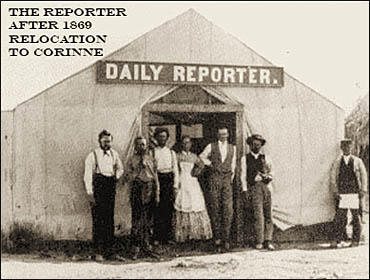|
LAWS IN UTAH
7
....
Washington, February 9, 1870.
J. H. Beadles [sic] examined.
By the Chairman:
Question. Mr. Beadles, please state your residence. -- Answer. My present residence is Corinne, Utah; I was editor of the Reporter, the Gentile paper
published at Corinne; I have lived there since the middle of last April: before that I lived for eight months in Salt Lake City.
Q. The Committee on the Territories have now under consideration a bill in relation to Utah; they are desirous of learning all they can of the condition
of affairs in that Territory; they would be glad to have you state anything you may know upon that point, or pertinent to the general subject of the bill,
which, I believe, you have read. -- A. Yes sir; I examined the bill when it was first printed, and again last evening and this morning very carefully. I regard
the bill as comprehending all that is within the
8
LAWS IN UTAH
power of the legislative department in connection with the subject. If anything more is necessary, it is the action of the executive branch of the
government. The portions of the bill which struck me as being particularly appropriate, and indeed necessary, are, first, that which limits the power
of the probate courts; second, that which nullifies their present system of voting; third, that which gives additional power to the United States marshal.
These are the features which I have particularly dwelt upon in my correspondence and editorial management as editor of a Gentile paper in Utah
Q. I think some one said you were a lawyer. -- A. Yes, sir; before going west I practiced law in Evansville, Indiana.
Q. Will you state to the committee the sentiments of the people of Utah toward the United States government and its citizens, so far as you have
observed during your stay in Utah. -- A. The sentiments of a large proportion of them are those of either active or passive hostility to the government.
With most of them it is a passive hostility; not the vindictive hate of the rebels, but something of that passive sort of hostility which we ascribe to the
High Church party in England. There are three principal causes for this hostility. First, the nationality of the people -- seven-eighths of them being foreign.
At a rough estimate, I should say that the population of Utah might be classified, as regards nationality, about as follows: From Great Britain, England,
Scotland, and Wales -- one-half; from Scandinavia, Sweden, Norway, and Denmark -- one-third; ten or fifteen each from France, Italy, and other countries
in southern Europe; a few Orientals; twenty or thirty Sandwich Islanders; and a few Americans. The Americans, again, may be divided into two classes:
The oldest converts, original Mormons, converted by Joe Smith and his co-laborers, and who are mostly from New England, New York, and Pennsylvania;
and the later converts, mostly from the South -- Mississippi and the Carolinas -- poor whites, "far-downers," "sand-hillers," "mud-sills," as they were
formerly called. The foreigners could not be expected to have any love for our institutions as the result of Mormon teachings and influences, and those
are the only ones that are permitted to reach them. They were formed into groups before leaving the Old World, and put under the control of a Mormon
elder before they start. This same organization is kept up across the ocean, and after reaching our shores, across the country; so that they do not come
in contact with the American people. So all their impressions of American character and institutions are necessarily only those received from the Mormon
leaders; and these are, I may say, I think, without a single exception those of bitter hostility to the United States. It is true they boast loudly of their
"loyalty," but let the government send out there a judge who refuses to be a tool of Brigham Young, and you can soon see what it all amounts to. There
is another fact, which creates a more active hostility. The Mormon church started out as a church of Millenarians. Joe Smith and Sidney Rigdon at first
preached Millenarian doctrines -- that is, that "the last days are at hand;" in fact, they at first adopted the name of "Last-day" Saints -- afterwards
changed to "Latter-day" Saints. They now teach that shortly -- in a very few years, at the farthest -- there will be a complete destruction, not of the world,
but of this government. And the great prophecy, to which all others are subordinate, is that delivered by Joseph Smith, on the 25th of December, 1832, and
first published in the Seer -- a Mormon periodical at Washington -- in April, 1854:
"Verily, thus saith the Lord concerning the wars that will shortly come to pass, beginning at the rebellion
of South Carolina, which will eventually terminate in the death and misery of many souls. The days will come
that wars will be poured, out upon all nations, beginning at that place; for behold the southern States shall
be divided against the northern States; and the southern States will call upon other nations -- even the nation of
Great Britain, as it is called; and they shall also call upon other nations to defend them against other nations:
and thus war shall be poured out upon all nations. And it shall come to pass, after many days, slaves shall
rise up against their masters, who shall be marshaled and disciplined for war. And it will come to pass, also,
that the remnant which are left of the land (the Indians) shall marshal themselves and shall become exceeding
angry, and shall vex the Gentiles with a sore vexation. And thus, with the sword and by bloodshed, the inhabitants
of the earth shall mourn: and with famine and plague and earthquakes, and the thunder of heaven, and the fierce
and vivid lightning, also, shall the inhabitants of the earth be made to feel the wrath and indignation and chastening
hand of our Almighty God; until the consummation decreed hath made an end of all nations; that the cry of the
saints and of the blood of the saints shall cease to come up into the ears of the Lord of Sabaoth from the earth to
be avenged of their enemies. Wherefore stand ye in holy places, and be not moved until the day of the Lord come;
for behold it cometh quickly, saith the Lord. Amen."
Mormon theology teaches that, in accordance with this great prophecy, the United States government is very soon to be destroyed. There have been,
I suppose, ten
LAWS IN UTAH
9
thousand commentaries made upon that revelation. When the rebellion broke out, the Mormons supposed the appointed time had come; but as that
ended suddenly, they now contend that it must soon break out again and desolate the country until there shall be seven women to one man: and then
the new kingdom shall be set up, and the saints, i. e. of course the Mormons, take possession of the whole country. It will be readily understood
how constantly preaching that these things were soon to occur would make them constantly long for that time to come. The leaders never weary of
portraying and denouncing the United States government and people. It is all nonsense to pretend loyalty to institutions and to a government that they
prophesy, and desire, and expect, to see shortly done away with.
Another reason, more effective than all else in promoting active hostility among the Mormons toward the United States government and people, is found
in the history of the church as they understand it, as laid down in their books, and as taught by their leaders. They are taught that, from the very
beginning of the church's existence the saints have been persecuted, and murdered, and cruelly treated, and all redress and justice denied them, and
all for no other reason except their religion. I have heard George A. Smith rehearse the history of the church not less than a dozen times; I have seen
the tabernacle crowded with ten thousand people, all wrought up to such a furor of excitement at the recital of the outrages that the saints had suffered,
that it would seem positively dangerous for a Gentile to be there. It is a part of the policy of the leaders to keep the people in a state of constant hostility
to the government and people of the United States.
By Mr. Moore:
Q. From your statement, there would seem to be a studied effort on the part of the Mormon leaders to prevent their people from coming in contact with
our people? -- A. Certainly there is. A man who had long been a Mormon, but afterward apostatized, told me that in coming from England by the old route,
from Liverpool to New Orleans, and from there to Hannibal City, that on reaching the railroad they were put in separate cars -- cattle cars -- and told to
have no communication whatever with the people along their route; that they were in a country where persons known to be "saints" were murdered: and
consequently they must not even let the people know they were Mormons. Of course, under such circumstances, they could have no opportunity of
learning the truth regarding our institutions and our people. It would be almost impossible for an eastern man to understand how a foreigner could get to
the center of our country and know so little about it. I have asked not less than fifty intelligent Mormons what route they came to reach Salt Lake City;
and I do not recollect more than two among them all that could give me the name of a single town along the route. A party came over from England in
1863, one of whom drove a team with me across the Plains: he could recollect the name of one place in New York State; he remembered it particularly,
because there the cars broke down, and the passengers were without food for a day or two, and were furnished with provisions by the people. It was, and
is even to this late day, a subject of amazement to him that 'Gentiles' would give a starving man anything to eat. As I remarked, the wrongs, and murders,
and religions persecutions which they say have been inflicted upon them by the people of the United States, furnish the staple of sermons and teachings
by the leaders of the church. And unfortunately, upon this one point there is more harmony of feeling among the Mormons than on any other. The
Recusants. the Josephites, and others who have abandoned Brigham Young, and repudiated many of his teachings, scarcely seem to have attained to
any better knowledge of the Gentiles.
By the Chairman:
Q. To return to this matter of the probate judges. Who are they, and by whom are they appointed? -- A. The organic act of Utah is very loosely worded
to start with. The powers conferred by its provisions are expressed in language at once indefinite and ambiguous, as if on purpose to allow of a
mischievous latitude of construction. It provides for both district and probate courts, and says that the probate courts may have "such jurisdiction as may
be prescribed by law." And the legislature has given to the probate courts complete jurisdiction of all matters, civil and criminal; it has concurrent
jurisdiction with the courts of the United States, and in matters relating to divorce and alimony, exclusive jurisdiction. And thus the laws are made
subservient to the demands of that perverted sexualism which is the basis of Mormonism: and the result is that, claiming to hold the marriage relation
so remarkably sacred, there are more divorces in Utah than in any other community of the same number of people any where else in the United States.
The causes of divorce are so numerous and so trivial that it is no wonder they do not wish them to come before the United States courts. Here it is that
the civil jurisdiction interlocks, as it were, with the ecclesiastical jurisdiction. When a divorce is procured, the sealing marriage, which takes place in the
"endowment house," is first dissolved; then a divorce is obtained, according to law, in the probate courts. For many years, Brigham divorced whomsoever
he pleased, on his own motion, without any law at all, on payment of a ten-dollar fee. He boasted to his
10
LAWS IN UTAH
congregation, in one of his sermons, that he "made enough by their damned foolishness in such matters to keep him in spending money."
Q. He would not swear that way, in his sermon, would he! -- A. O, yes; that isn't considered swearing among the Mormons; nothing is regarded as
swearing by them unless the name of God is used. But, as I was about to say, of late years it has been considered best to pay some attention to the
forms of law; and now, although parties must first be divorced in this ecclesiastical way, they are afterward divorced according to law in the probate
courts. Of course, these probate courts never oppose Brigham's wishes. And thus is presented a most remarkable anomaly in legislation -- a community
with no marriage act, but with an act providing for divorce; with no provision for the recording of marriages, but with records for the dissolution of marriages.
Q. But is there no record kept of these ecclesiastical marriages? -- A. If there is, it is not known to Gentiles. It is hinted that there is such a record: and
at one time, three or four years ago, the Mormons, or some of them, said they would produce that record; but it has never yet been produced, as any
officer knows of. Whenever parties desire to be "sealed" for time and eternity, it is done in the endowment house, if the parties can reach Salt Lake City.
What transpires in that endowment house very few women know until they are married; it is very rarely that a woman ever enters it until the occasion of
her marriage; one of these was Mrs. Sarah A. Carmichael.
Q. What is the endowment house? -- A. The endowment house is a large adobe building, near the northwest corner of Temple block, into which no
''profane Gentile" can ever enter; it is sacred and secret. As to what occurs therein, there are three written accounts: One by Elder John Hyde, jr., who
preached Mormonism for six years in England; on returning to Utah, and observing the practical workings of the institution at home which he had been
promulgating abroad it was more than he could endure. He was sent on a mission, and apostatized as soon as he was safely out of the Territory.
Another account is by Mrs. Marietta V. Smith, daughter of Silas Corey of Hornellsville, New York. The third is by a lady whose name I do not now
recollect. These written accounts differ a little as regards the details of the ceremony. The principal portion of it consists of a grand drama, representing
the creation of the world, and of Adam and Eve in the garden of Eden; the temptation of the serpent; the fall, and man's condition after the fall; the contest
among the different sects in the world, and the errors of the sects; and here comes in the holy priesthood: Peter and James and John descend, and
anoint Joe Smith and others to be their successors; then the candidates are initiated into the four orders of the priesthood. In reference to the ceremony
of initiation there is some difference in the accounts, probably the ceremonies have varied in different cases; but as to the penalties for violation of the
oaths of the orders there is no disagreement. For the violation of the oath of one order, the penalty is to have the throat cut from ear to ear; of a second,
to have the bowels slit across; of a third, to have the blood spilt upon the ground; of the fourth, to have the heart torn out, &c. These secret oaths seem
to exercise a fearful power over all Mormons; even apostate Mormons, when far out of the reach of the church, and where its penalties certainly need not
be feared, seem to hesitate to speak of them.
Q. Have you stated to the committee who these probate judges were, and how they were chosen? -- A. I stated in part what the judiciary act provided;
it also provides that the probate judges shall be appointed by the territorial legislature, instead of being elected by the people: this means, practically,
an appointment by Brigham Young; the most prominent elder or bishop in each county is generally selected; in our county the probate is Elias Smith,
a Mormon elder, an old Englishman, with six wives; two of them his nieces, his brother's daughters.
By Mr. Bickley:
Q. Is it common among the Mormons for marriages to take place between persons so near of kin? -- A. Well, not common: but sufficiently frequent to
establish it as a lawful custom: I know one case where a man married his half-sister; the marriage of cousins is very common: but these, what we would
call incestuous marriages, occur mostly in the southern settlements, where the people are more benighted: Brigham says that this is a part of the
question of incest upon which no clear light has as yet been given; but that his prejudices prevent him from practicing it; Stenhouse says, "The prejudices
of the old world cling about us yet; but when the children of the third generation of polygamists have reached maturity then you will have in these valleys
the true feeling of patriarchal life."
By Mr. Cullom:
Q. About these judges who are Mormon bishops; in what estimation are they held by the Mormons; are they looked upon mainly as judges, or as
bishops? -- A. As bishops rather than as judges; for instance, suppose a difficulty to arise between two Mormons; they go before one of these judges,
but they call it going before the bishop, and such it practically is, for the question is decided by him in his ecclesiastical capacity, and if an appeal is
taken, it is not to any superior court known to our laws but to the Mormon high council: and the final appeal is from the high council to the
LAWS IN UTAH
11
first presidency; in hundreds of miles of travel through the Territory you will nowhere hear of a judge making a decision, it is always the bishop; but in cases between
Gentiles, or between a Gentile and a Mormon, then this officer acts in the capacity of judge.
Q. In such a case, where a Gentile and a Mormon are concerned, do these judges generally render an impartial decision, or do they decide in favor of their own
people? -- A. Well, I will do our bishop -- we call him "our bishop" in accordance with the universal custom -- the credit to say that, where no special interests of his
religion are involved, he generally does substantial justice. He knows nothing of law; but in ordinary cases, when not instructed by the "council," he will use his best
judgment, and generally do nearly right.
By Mr. Buckley:
Q. Then they are regarded as Mormon ecclesiastical officers, rather than as officers of the civil law? -- A. Always so regarded. By the church they are considered
and addressed exclusively as bishops; and we Gentiles, when in court before them, while we address the presiding officer as "judge," we feel that he is a bishop. In
conversation with a prominent minister recently, I illustrated the condition of affairs in Utah in this way: Suppose that in the State of Indiana the Methodists, (I referred to
the Methodists because my friend was a preacher of that denomination, and to Indiana because that was his residence, and formerly mine; suppose that in the State
of Indiana the Methodists were more numerous than all other denominations, so numerous as to outnumber the membership of all other denominations together, by
thirty to one, (that is about the proportion of Mormons to Gentiles in Utah:) suppose that instead of being as enlightened and intelligent as they are they were as
benighted and ignorant at the masses of the Mormons are, and, like the Mormons, followed blindly the dictation of their bishop; suppose they should elect the bishop
of their church to be governor of the State; and for lieutenant governor the officer in the church nearest the bishop in rank; for the upper house of the legislature, should
elect prominent presiding elders; for the lower house, other presiding elders of less prominence; for judges of the courts, should elect the leading circuit preachers; for
county officers, local preachers, &c., down to the lowest township officers. Nobody not a Methodist could be elected to any office of whatever grade; no other ticket
would be in the field; the church would direct the people to vote that ticket, and in case of refusal would cut them off as apostates. It will at once be seen that the whole
State would be entirely in the hands of the Methodists; the laws enacted would be based, not upon the Constitution of the United States, but upon the Methodist
discipline; and other denominations -- Baptists. Presbyterians, &c. -- would stand as much chance of obtaining justice as Sampson among the Philistines. Now, instead
of Methodists say Mormons, and instead of Indiana say Utah, and you will have some comprehension of the condition of affairs in that Territory.
By Mr. Cullom:
Q. What proportion of the people of Utah are polygamists? -- A. In regard to that matter I shall be compelled to differ with others who have testified upon the subject.
I am quite confident that not over one-sixth of the adult male population of Utah are polygamists. Of course more women are polygamists, practically, than men.
Some urge estimates are made as to the number of polygamists; but as the numbers of the sexes are equal in Utah, it is manifestly impossible for everybody to have
more than one wife.
Q. How many of those not practically polygamists are in sympathy with it? -- A. I think about one-half the entire population.
Q. What is the entire population of the Territory? -- A. I have made a careful estimate; of the towns as far south as Fillmore, and up the Sevier River, and have
compared my own estimates with the statements of travelers further south, and I think the population is from ninety to one hundred thousand. I do not, believe it
would reach a hundred thousand.
Q. What proportion of these are Gentiles? -- A. When I left Utah there were very nearly three thousand. In Salt Lake City there were, last winter, eight hundred
resilient Gentiles. I made up that list from the subscription list of the Daily Reporter, from the roll of the Masonic and Odd Fellow lodges, from the roll of the Hebrew
Benevolent Society, from the list of communicants of the Gentile church, (Episcopal,) from the list of the Gentile Sunday schools and day schools, and similar records;
besides being personally acquainted with nearly or quite every one of them.
Q. It has been argued by some newspapers, and by others, that any law which might he passed by Congress, the effect of which should be the destruction or
prevention of the system of polygamy, would produce great distress, particularly among the women. What do you think in regard to that matter? -- A. No such
statement can ever made by any one acquainted with the condition of affairs in Utah, I think. To any one who had ever lived there such a question would be simply
surprising. The women support themselves now, and in many cases support their husbands too.
12
LAWS IN UTAH
Certainly a law releasing them from their husbands could not make their condition any worse. A large majority -- I have no hesitation in saying five-sixths -- of the
women in polygamy support themselves by their own labor. I could mention the names of leading and well-known Mormons, whose wives keep millinery shops, boarding
houses, &c, or do weaving and spinning for a living. Country bishops generally have three wives, by which means a very convenient and economical division of labor is
secured. One acts as housekeeper, the second is gardener, while the third does the spinning, weaving, and washing for the family.
By Mr. Duval:
Q. If polygamy were let alone, and permitted to continue without restraining influences, would it gradually die out, or would it become worse from year to year? --
A. It would doubtless become constantly worse, if ''without restraining influences;" but restraining influences are at work. The most hopeful feature of the whole affair,
in my judgment, is in the fact that nearly all the young girls, those just growing up into womanhood, are opposed to polygamy. And I believe that even if the United
States government should do nothing specifically against polygamy, but simply give a sort of sanction to this and other disintegrating forces, the question of polygamy
would by and by settle itself, and the rising generation slough it off in the course of the next twenty or thirty years.
By Mr. Buckley:
Q. It is alleged, and with some degree of force, that polygamy will cure itself, if simply let alone; that with the opening up of railroads, and the settling of the country
around them, those people will be brought into contract with American institutions, and polygamy and its kindred abominations gradually fade away before the
advancement of a higher civilization. What is your opinion upon that point? -- A. It never would, so long as such absolute power is left in the hands of the Mormon
hierarchy. They could almost completely nullify all these outside influences, and perpetuate polygamy indefinitely. But if you can in any way break the power of the
Mormon hierarchy, even though you should decide to make no crusade against polygamy itself, I think these disintegrating influences would be sufficient to destroy it
in twenty or thirty years.
By Mr. Duval:
Q. To what extent is Mormonism increasing by the accession of new converts? -- A. Not nearly to so great an extent as they claim. The additions for five years
past have numbered from one to three thousand a year -- men, women, and children. To balance that, however, there has been considerable apostacy; so the increase
has not been very great, after all.
By Mr. Cullom:
Q. Is the increase of the population by births larger, in proportion to the population, than it is in the States? -- A. No, sir; I think not so large in proportion to the
number of women. I know the medico-theologians among the Mormons claim that population increases much faster under their system, but from the testimony of
unbiased physicians, and of old women, who are pretty apt to know the fact in relation to such matters, I think the contrary. You see, the question is not whether one
man will has more children with five wives, but whether each of those wives has more children than she would with a husband of her own. The bishop of [Provo] has
five wives, and not a single child. As a general thing, I do not think that the wives, in households where polygamy is practiced, average as many children as the
ordinary women of our agricultural communities. To this, however, Heber C. Kimball seemed to be an exception, and Brigham Young likewise. Kimball had twenty-two
wives in all; at his death he left eighteen widows, eleven of whom still reside in his block -- he had in all forty-one children. Yet it is not unreasonable to suppose that
of those twenty-two wives, one-half, at least, should be child-bearing women -- for whom forty-one children would be a small allowance. When Heber Kimball was living,
it used to be noted as a curious fact that there were in Salt Lake City five men with an aggregate of seventy wives and one hundred and fifty children. The bishop of the
ward in which I lived has thirty children living, and twenty dead. Another bishop, with six or eight wives has seventeen children buried in a row, and the longest grave is
not over four feet.
Q. What is the population of Salt Lake City? -- A. I should say a little less than eighteen thousand.
Q. How many of the ninety or one hundred thousand Mormons -- that, I believe, is what you estimate the population of Utah to be -- are dependent for their support
entirely upon the labor of their hands, and not upon the revenues of the church, or upon their connection with the heads of the church? -- A. Nearly all; the remainder
would constitute so small a proportion as not to be appreciable in a politico-economical point of view. The farms in Utah are generally small, particularly in the northern
settlements --
LAWS IN UTAH
13
say from five to twenty acres; the latter is regarded as quite a large farm. Artificial irrigation is necessary in that country, and, with their awkward system
of irrigation, twenty acres is about as much as one man can attend to properly. As a result of this system of small farms, the Mormons naturally settle in communities.
The whole Territory is divided, into wards; and the center of each settlement is so thick as almost to amount to a village. Each of the wards has an incorporated
government, with a mayor and other city officers; and has also an ecclesiastical organization, whose authority extends over all the adjacent country. The people farm
these small patches of which I have spoken, and live upon the proceeds, besides paying one-tenth to the church. The great majority have but one wife. Living in that
country is tolerably cheap. The region is peculiarly adapted to grazing. Utah can turn out the finest beef cattle in the world. Wheat, rye, bailey, pumpkins, carrots, and
turnips flourish particularly well; but for Indian corn the climate is a little too cool. Imphee cane grows luxuriantly where there is no alkali in the soil, and is largely
cultivated for the molasses obtained from it.
Q. You speak of breaking the political power of polygamy. This bill, which the committee have agreed to recommend to the House, disfranchises -- cuts off' from
the right to hold office, or to vote, or to pre-empt land -- all persons actually living in and practicing polygamy. Would you, or not, regard that as being an effective
means of breaking the political power of Mormonism? -- A. Assuredly, I should. The most important things to be done are the removal of power from the probate
courts, the disfranchisement of those guilty of polygamy, and the giving the United States marshal the power to enforce the decrees of the district court. This would
completely destroy the political power of the Mormon hierarchy everywhere north of Salt Lake City, and I think in Salt Lake City, too. But when you pass the canyon
of the Jordan, from there south, through what is known as the "black country," it would be more difficult to carry these measures into effect.
By Mr. Taffe:
Q. In Utah, do as many children live and grow to adult age as in communities where polygamy does not prevail? A. No, evidently not; not even according to their
own statistics. But I would not be understood as attributing this entirely to polygamy. It is largely the result of their fanaticism, or "reliance-on-faith doctoring;" their
general prejudice against the medical profession, and practice of resorting to their priests instead, to be cured by the laying on of hands. Neither knowing nor
practicing any physiological
14
LAWS IN UTAH
or hygienic laws, diseases and deaths are very frequent, especially among children.
Q. Have you ever heard Brigham Young preach? A. I have, frequently.
Q. Did you ever hear him refer to the government of the United States, or to any attempt on its part to enforce the law of 1862? -- A. I do not think I ever heard
him refer to that law specifically. I have frequently heard him refer to the government of the United States; I heard him do some tall swearing, once, in that connection;
he was giving a review of the judges that had been sent out to Utah, he began at Judge Brochus, appointed by President Fillmore in 1850, and cursed them regularly
and in order down to the present time.
Q. Then there is no concealment on their part that they consider the law of 1862 a dead letter, and that they have no disposition nor intention to obey it? -- A.
None whatever; on the contrary, they openly put it at defiance; they say it is unconstitutional; they say the Constitution guarantees to them a local form of government;
whatever bears hard on them they call unconstitutional; they regard as law whatever is expedient, and denounce as illegal whatever they do not choose to obey. The
authority of the church is paramount: that they openly avow.
By Mr. Buckley:
Q. You speak of the necessity of breaking the political power of the Mormon leaders: but can we strike at that political power without laying ourselves open to the
charge of persecuting the people for their religious faith? A. With the more fanatical portion -- one-half the people, and perhaps more -- you could not; they would
regard any action illegal which should interfere with polygamy. Do not understand me as claiming that the good effects of this bill would be made manifest immediately.
I have no doubt there would be a year or two of general confusion and uncertainty. But what I say is, no class of community need suffer. So far as suffering is concerned,
there could not but be, it seems to me, less suffering than now; the women who would cease to be regarded as wives under the operations of the law would only have to
support themselves and their children, and that they have to do now; the tithing system would be abolished; the people would be permitted to trade wherever they
chose, buying wherever they could buy cheapest, and selling wherever they could sell to the best advantage. The polygamists generally, I doubt not, would shortly
receive a revelation commanding them to seek some new home, and would leave in large numbers, and their places be supplied with Gentiles.
LAWS IN UTAH
14
Q. Where would the Mormons go to? -- A. To Arizona: it may not be generally known, but it ts a fact, that the Mormons now own an entire county in Arizona.
Q. If they should determine to leave Utah on account of the action of the United States government, would they stop again inside of the United States? -- A. The;
would for some years; they could not leave immediately. It is noticeable that the Mormons have been constantly establishing their outposts farther and farther south,
until they now reach nearly to Sonora, in Northern Mexico. And these Mormon settlements extend in a band, not over fifty miles wide anywhere, and in most places
nut over ten miles wide; the whole constituting a sort of an arc for five hundred miles Commencing at Malade City, in Southern Idaho, we pass through Oneida, Bear
Lake Valley, Cache Valley, Bear River Valley, Salt Lake Valley -- in which I include the farms along the eastern shore of Salt Lake -- Jordan Valley, forty miles long,
extending to Provo, and the Utah Lake district. There a new point of departure might be taken: that brings us to Mount Nebo, sixty or seventy miles from Salt Lake City,
and across the big divide; we then pass Payson, Pondtown, Le Van, Chicken Creek, and Salt Creek, to Fillmore, the old capital. Here again we might take a new point
of departure; Sevier River runs through Southeastern Utah, and has some small settlement along its course; from Fillmore, south, you pass St. George, Washington,
Harmony, Cedar City, Santa Clara, and Mountain Meadows, which brings you to the Great Desert; crossing the desert you have, a little settlement on the Rio Virgin,
and another on the Big Muddy -- which are really in Southeastern Nevada. Below these there are a few detached settlements, extending into Arizona. The whole
constitutes a belt of settlements of not less than five hundred and fifty miles in length.
By Mr. Cullom:
Q. The bill before the committee contains a section providing for a system of proceedings in court for the condemnation and sale of property belonging to
Mormons who shall be convicted of polygamy and sent to the penitentiary, or shall move away, leaving their wives and children without support -- the property to
be sold for the support of the women and children. Is it your opinion that there would be really any necessity for that sort of a provision in the bill? -- A. I do not
know that I am quite clear on that point. It is doubtful whether occasion would often arise for the enforcement og that provision of the bill. To convey to the committee
my ideas on this subject, it would be necessary to preface them with a lengthy explanation of the manner in which these family matters are managed in Utah. Unless
the husband is a hotel-keeper, as I have before! described, the wives generally live in different places, each on a little patch of ground, a few acres; from this she obtains
her own living; but it is not hers; no means for a woman's support are provided, whether the husband be living or dead; the right of dower, &c, are things unknown to
Mormon law.
By Mr. Taffe:
Q. Suppose a woman marries, who before her marriage had property in her own right; do I understand that she loses the right to that property when she marries?
-- A. I cannot give you the exact wording of the law upon that point. The practice is for the church authorities to take the matter in hand and settle it: and when a man
dies, they divide the property up, giving so much to each widow. I do not understand that any provision is made for any legal proceedings in reference to the case. A case
of this kind has arisen with our new assessor. Heber Kimball, on his death, left something to each of his children; the assessor claimed the right to tax as legacies all
the bequests, except those to the children of the first wife; this of course, the church resisted, and the question has been referred to the revenue department; the
decision of the department in regard to the matter, I have not learned.
Q. What do you think as to the possibility of enforcing the provisions of a law like that proposed by the committee? Do you anticipate a resistance which would
result in bloodshed, or a general war? -- A. I find that the idea prevails largely in the States, at least I have seen it set forth in the editorials of leading newspapers,
that any attempt to enforce such a law would precipitate a furious and desolating war in Utah. One paper says it would require a standing army of forty thousand soldiers
to enforce it. Now it is barely possible that by sending out three hundred men and letting the Mormons destroy them, and follow them up by three hundred more and
letting them'" destroyed, and so on, you might manage to aggravate it disturbance into something like military proportions. But let the government take the initiative
and send out two thousand men, placing, say six hundred at Camp Douglas, and three or four hundred each at each place where a district court is held, and two or
three hundred at Provo, Ogden, and Brigham City, and I would pledge my life almost that there never would be a particle of trouble.
Q. What do you consider the actual military strength of the Mormons? -- A. If Brigham Young were given full and fair warning, say six or eight weeks' time, he
might be able to muster eight thousand men capable of holding a musket. I have seen the tabernacle as full as it could hold, and it will hold about ten thousand people,
but I
15
LAWS IN UTAH
have never seen the time when a regiment of able-bodied men could be got out of it. Of the eight thousand men whom I have mentioned, the Americans and most
of the foreigners living in and near Salt Lake City, have some skill in the use of arms; but as for the rest, a heterogeneous assemblage of Swedes, Danes, Norwegians,
Welsh, &c., the more of them there were together, the easier they could be whipped. Give me our old regiments, the Fourteenth and Thirty-first Indiana, and I will take
the contract to whip all the men Brigham Young can bring into the field.
Note: Evidently no newspaper published the full House testimony relating to the "Cullom Bill" when that issue was up for review in the Committee on
Territories. The Baltimore Sun of Feb. 15, and Feb. 17, 1870 printed some excerpts (as did several other papers at that time) but distribution of the
entire record had to wait until "House... Report 21" of the 2nd Session of the 41st Congress was published. Even then, not much of the recorded
testimony found its way into the popular press. John H. Beadle's testimony remained "buried" for years, and has never been cited in books and articles
dealing with his journalistic career. -- The one section of Mr. Beadle's testimony which did receive some national coverage was his answer to the question:
"What is the endowment house?" The Sun's reporting of Feb. 17th reproduced Beadle's answer almost verbatim, and a number of American
papers reprinted shorter excerpts from the Sun's columns.
|

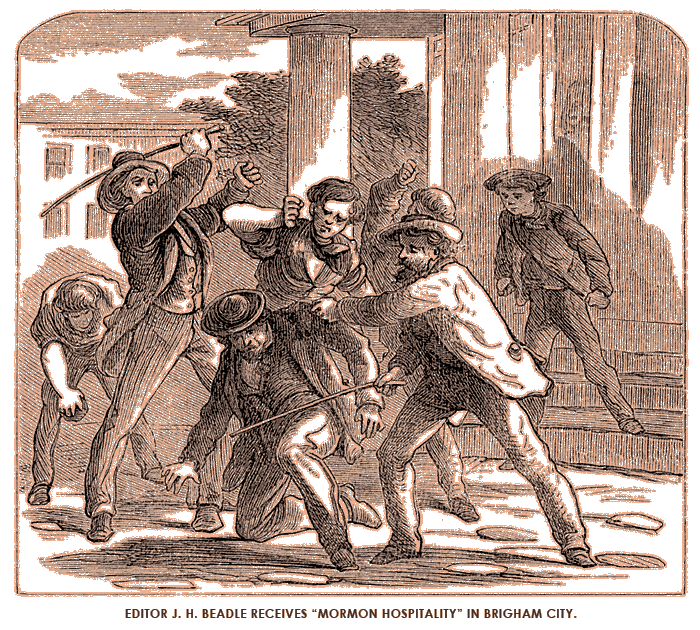
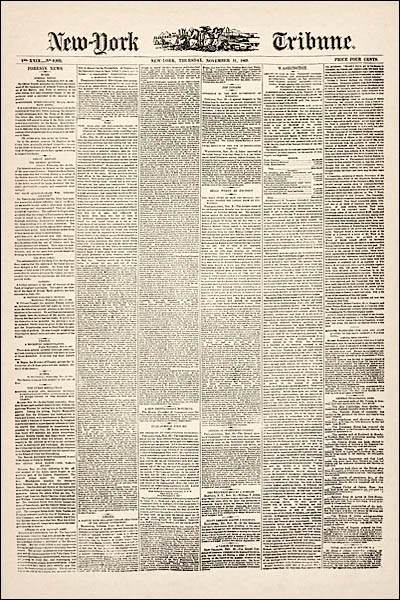
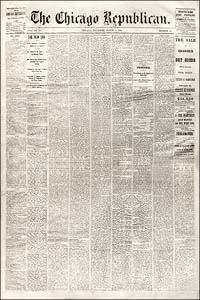
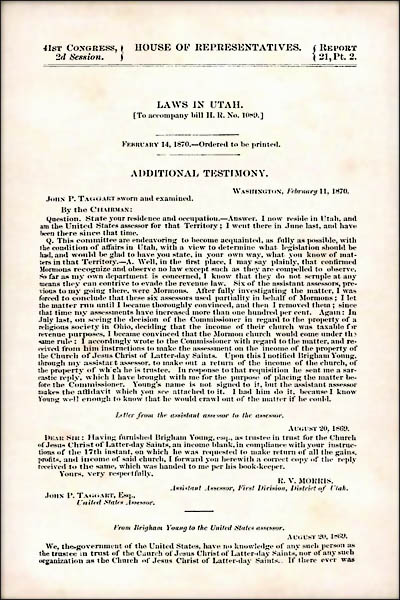
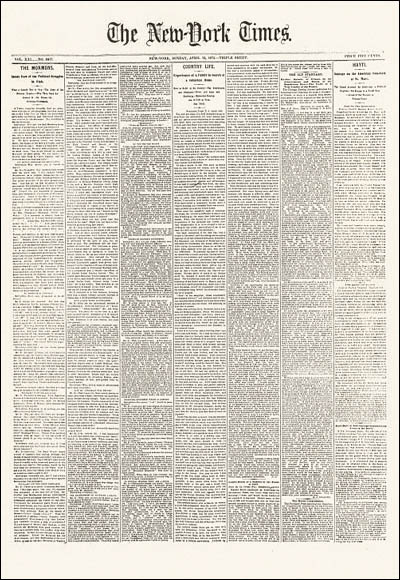
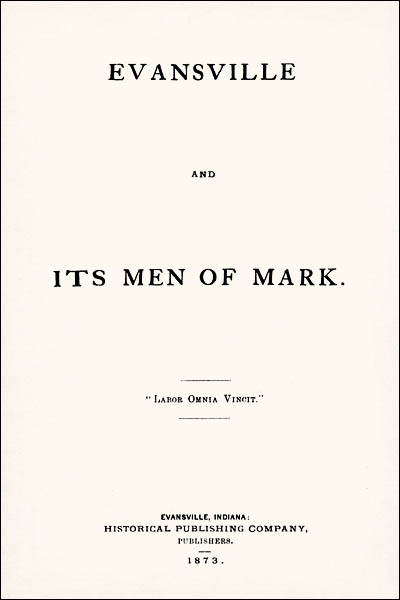
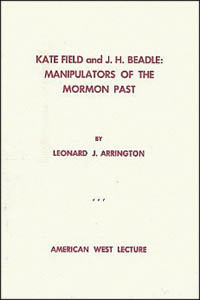

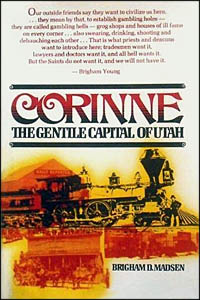
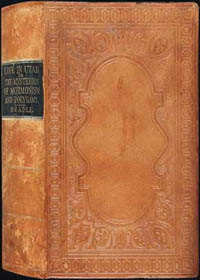 Note 1: John Hanson Beadle was in Washington, D. C., during the first part of February, 1870, testifying about polygamy and
Mormonism before the House Committee on Territories. By early March Beadle had arrived in Philadelphia and on the 8th of that month
he penned a letter in that city and sent it to the Cincinnati Commercial for publication. Beadle evidently made a side-trip to
Philadelphia at that time in order to finalize the National Publishing Company's printing of his first book, the lavishly produced
Life in Utah. That company began running ads for Life in Utah in the Philadelphia Inquirer's issue of April 5th.
Note 1: John Hanson Beadle was in Washington, D. C., during the first part of February, 1870, testifying about polygamy and
Mormonism before the House Committee on Territories. By early March Beadle had arrived in Philadelphia and on the 8th of that month
he penned a letter in that city and sent it to the Cincinnati Commercial for publication. Beadle evidently made a side-trip to
Philadelphia at that time in order to finalize the National Publishing Company's printing of his first book, the lavishly produced
Life in Utah. That company began running ads for Life in Utah in the Philadelphia Inquirer's issue of April 5th.
